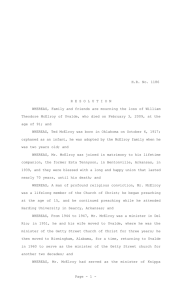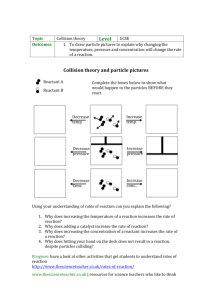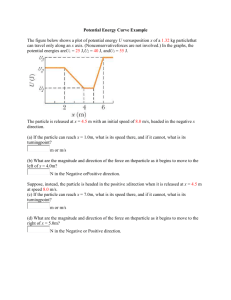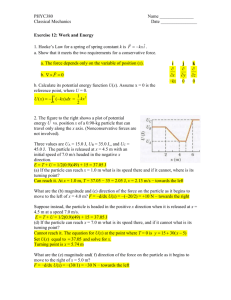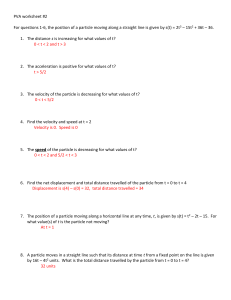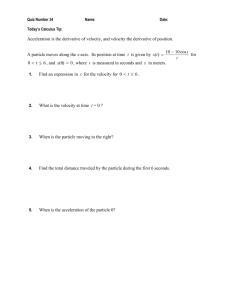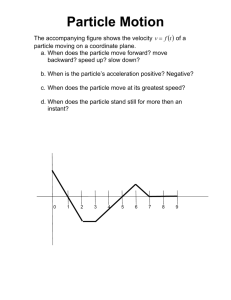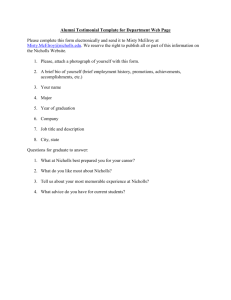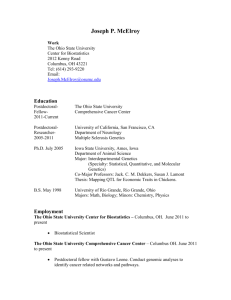201112231150460.Night.Soul.Biglieri.ess
advertisement
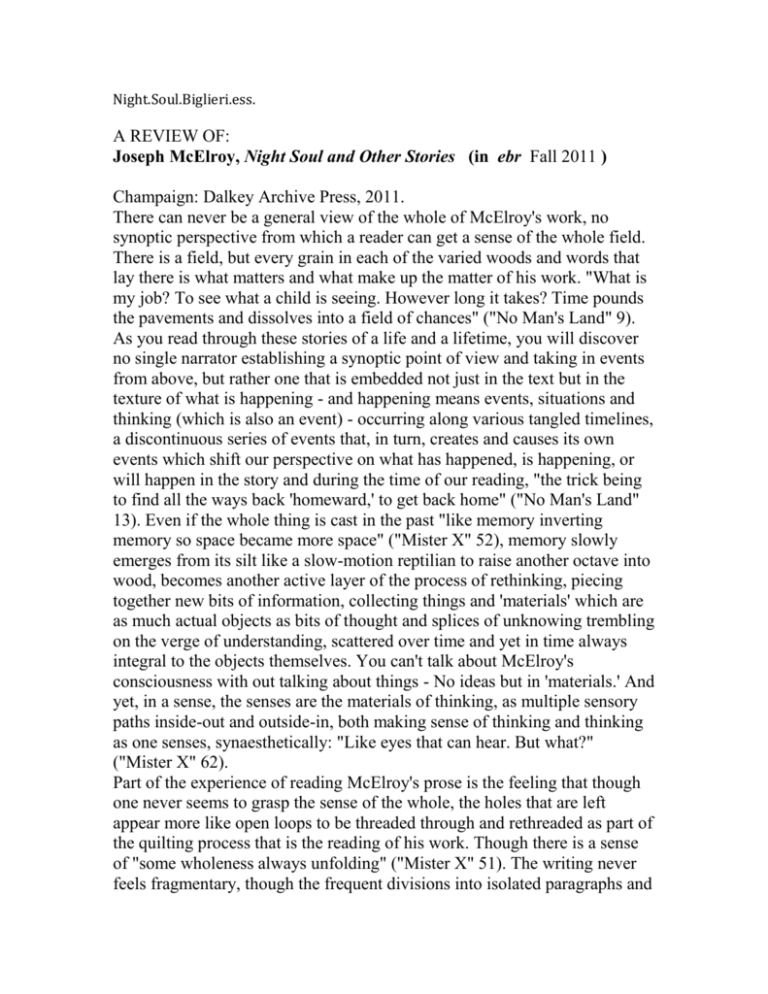
Night.Soul.Biglieri.ess. A REVIEW OF: Joseph McElroy, Night Soul and Other Stories (in ebr Fall 2011 ) Champaign: Dalkey Archive Press, 2011. There can never be a general view of the whole of McElroy's work, no synoptic perspective from which a reader can get a sense of the whole field. There is a field, but every grain in each of the varied woods and words that lay there is what matters and what make up the matter of his work. "What is my job? To see what a child is seeing. However long it takes? Time pounds the pavements and dissolves into a field of chances" ("No Man's Land" 9). As you read through these stories of a life and a lifetime, you will discover no single narrator establishing a synoptic point of view and taking in events from above, but rather one that is embedded not just in the text but in the texture of what is happening - and happening means events, situations and thinking (which is also an event) - occurring along various tangled timelines, a discontinuous series of events that, in turn, creates and causes its own events which shift our perspective on what has happened, is happening, or will happen in the story and during the time of our reading, "the trick being to find all the ways back 'homeward,' to get back home" ("No Man's Land" 13). Even if the whole thing is cast in the past "like memory inverting memory so space became more space" ("Mister X" 52), memory slowly emerges from its silt like a slow-motion reptilian to raise another octave into wood, becomes another active layer of the process of rethinking, piecing together new bits of information, collecting things and 'materials' which are as much actual objects as bits of thought and splices of unknowing trembling on the verge of understanding, scattered over time and yet in time always integral to the objects themselves. You can't talk about McElroy's consciousness with out talking about things - No ideas but in 'materials.' And yet, in a sense, the senses are the materials of thinking, as multiple sensory paths inside-out and outside-in, both making sense of thinking and thinking as one senses, synaesthetically: "Like eyes that can hear. But what?" ("Mister X" 62). Part of the experience of reading McElroy's prose is the feeling that though one never seems to grasp the sense of the whole, the holes that are left appear more like open loops to be threaded through and rethreaded as part of the quilting process that is the reading of his work. Though there is a sense of "some wholeness always unfolding" ("Mister X" 51). The writing never feels fragmentary, though the frequent divisions into isolated paragraphs and the jumping back and forth through narrative time zones lead one to think that one would experience vertigo or at least a sense of dislocation. But McElroy's overriding concern with accurately and convincingly getting the coordinates right in space and time and from there to the experience of thinking through events, relationships and materials, events that connect across the span of years, stray bits of conversation that act as narrative quilting points, and the frequent sense that one is getting inside the materials, digging into the wood, burrowing inside and back outside, one feels even more embedded, anchored by a syntax that requires attention to get at the precise pace of the disclosure of information. The sentences then solder the links between various and only apparently disconnected moments of narrative as if keeping time inside the timing mechanism of the story; keeping time as in the sense of measure, or the hum of thought on the human scale of breathing. The work is not seamless, and it would seem less if it were, and doesn't just call attention to its seams but produces sentences that reveal odd syntactical patterns that makes sense only if one jettisons one's habitual grammars and accepts or agrees to swim in these sentences, unmapped, but perhaps guided by the grammars of timing and time. I like to come back to these stories and remember not knowing what was happening then, and still not now but in a different way, along two different trajectories but both inside the mind, trying to get in synch with the syntax and system, coasting for stretches and kicking the pedals backward to spin against the progress of the stories, almost gravity-free in contrast to the relentless forward progress of the real-time wheels; or then to sense that the stories are always not just there in space, inside the book, but already at full speed inside their own time. It's like watching the hubcaps on a speeding car reflect and spin back as if detached from the wheels that grip and speed flush against the surface asphalt and the inside, wheels within wheels, seeming gripless but as if in tandem, as if reversed to tiptoe in unison, what's distorted is in time to the reflection of your own thinking and again gripped in the sentence, as if "[t]wo different ways of same event happening simultaneously" ("Particle of Difference" 258) and you ask yourself, how does he do this? It's not just the syntax that seems to move in reverse, or rather peaks to lilt and recede like a wave, always looping back to where the sentence started which is another place in the mind. Always looping back toward a more precise articulation of the question it proposes rather than leaning toward the period as if it were an answer or an improvised end to speculation. The poetics of McElroy's sentences is located in the sense of hearing, guided by ear and frequently his "l's" mark the tips of particular waves as the sentence moves across points on a plane that hasn't been planed down but worked into miniature scrolls. One becomes aware of how often he plays variations on the phrase "late light" to describe the sky and it makes one think of Adorno on the "late work" of Beethoven in terms of its shimmer effects. "[I]n the settled November light of late afternoon . . . . in later light" ("Boomerangs" 36). Or in the story "Silk": "Speeding through the park the whirr of the wheels like wings, the late light, things in the air, a gossamer shine along a witch-hazel stem, a web, sparrows he had watched from the window of his bedroom" (224). These stories, these pieces in prose, these sentences strung between poetry (poetics) and a philosophical impulse that always shows McElroy to be thinking the means, thinking the meaning of the means and how this thinking is ceaseless and moves in waves. I always leave off reading McElroy's work (one never "finishes" a story, one pauses to reflect before swimming into the next one) feeling and sensing that I have gained a kind of wisdom, which is related to the fact that his narrators are always geared toward making sense of what they can't quite grasp and yet they are aware that they aren't the ones producing it, rather they are provoking it to come from others. "I mouth another's words but I mean them" ("No Man's Land" 21). "For nomad is the movement of others from me as if it made little difference who was the mover" ("No Man's Land" 30). But what knowledge they gain is through dialogue between people, and between people working with things, so that knowing comes from others and passes through the narrator as the quilting point as he becomes the conduit that accepts the part of being part of something else, which is in turn passed on through others, from friend to friend, women to men, sons to fathers. Knowledge in McElroy is what extends the power of listening and that power is exponential. That movement only occurs when we first confront what we don't understand rather than what we think we already know. This is the process that Vico writes of in The New Science and that seems apt to cite here: So that, as rational metaphysics teaches that man becomes all things by understanding them (homo intelligendo fit omnia), this imaginative metaphysics shows that man becomes all things by not understanding them (homo non intelligendo fit omnia); and perhaps the latter proposition is truer than the former, for when man understands he extends his mind and takes in the things, but when he does not understand he makes the things out of himself and becomes them by transforming himself into them." (Vico 130) This idea is also fitting in relation to how readers also listen in to others as they become part of what they hear, getting nearer to what they don't know and making up for the space of the echo by becoming themselves all ear. In order to properly experience McElroy's stories readers need to be curious precisely about what they don't understand, the fact that they don't quite get what's happening, can't quite fit the pieces of the puzzle together because each piece is its own puzzle and any form that appears to take shape is what reader and writer have worked on together by thinking through the materials, shaping the syntax by spotting each echo as a space for connection and absorbing the "late light' of a prose that shimmers in eclipse. Given his approach toward incipient knowledge, there is something of the child in McElroy seen in his play between sounds and in his endlessly inquisitive nature, playing as he investigates so we don't get the sense of the writer as a detective but rather begin to see the child as a detective looking for clues to everything he doesn't know, which equals his world. The key to gaining knowledge is not understanding. This might take some time getting used to, and seem to produce plenty of static interference, but this white noise gradually resolves into a kind of music and morphs into variations of static forming patterns you might never have heard if you hadn't first noticed that something was strange and wonderful. This is not just the music of thinking but thought itself as music, musing on and in music, embedded in the sounds and in the furls of the conch-like ear, from furthest outward cupping to the inverted shell that leads to listening inward. You begin by hearing fragments of what others have said, overhearing snippets of conversation and even piecing together complete sentences that you only thought you knew but which come back to haunt you like the afterglow of meaning's "late light." This collection of stories is not a diary of a dark night of the soul, but what remains in the "late light" of this Night Soul. In "Character," a story that is told to a woman who "happens to be an expert on sound" (111), we begin in the "stained hardwood" of a model whaleboat, whose "finish brought up a richer, plum band or stripe across the top side like the dark gap between the good creamy rings of Saturn in my book" (111). And this story will be about a memory, but memory not as in mind but as in hardwood, stained and grained with meanings that are felt and earned, meanings sensed in the sentences. We are placed in the position of the woman to whom the narrator is telling the story, "understanding that this isn't a story maybe" (113) and that perhaps it's "[p]art of something else" (112). It isn't just a story, it's the telling that matters, the truth in the telling provoked by listening in one's own mind while in the process of hearing somebody else. "I am finding the words; they, really, me" (117). Something is always part of something else, a part of things (Francis Ponge's Le Parti Pris des Choses), and never apart from them, detached and bodiless, but measures as poetry is a form of measure, the wing-beat of time, as man is the measurer of all things that whisper their own name. Nothing will come of something else. Hear again: this measure, this specific weight, this "independent gravity," as things live through us and we live through things, this measure, this poised weight, plumb line of syntax, part of the sentences and "part of something else," measured and minded, this measure that is more than some of its parts and more than the sum of its parts, and not the whole either, but just the part that is a part of something else, bigger than itself, connected, threaded, meshed, pebbled, made to the measure of the grain, "a richer plum band," a plumb line, a balance of mind between "the good creamy rings of Saturn in my book" (111). "Character" and the story that follows it "Canoe Repair" dovetail nicely through theme and variation. Again there is that sense of "late light": "It's light above but the canoe is dark, is it that the light of night at whatever distance needs extra speed to catch our canoe, or is it a clandestine humidity we turn upward in as the paddle lifts forward" (167). In describing the movement of the canoe McElroy shows us that for him beauty is not the promise of happiness, but "a sideways quickness that is a promise of forward speed" (167). In "Annals of Plagiary" McElroy addresses the lurking question of what happens when others use one's own words and call them their own, "her answering words were not hers but mine - my own written and printed words speaking at me" (173). The narrator who has heard his words spoken by the artist in a television interview decides to visit this artist's "installation," where she is showing "Her 'piece.' Pieces, I would say" (174). There is a calculated playfulness here in McElroy's quip about found objects "as if there could be visible objects unfound" (175). But I think McElroy is asking more substantive questions in this story. McElroy's critique of this kind of "appropriation" suggests that this artist's work collects and showcases used things or things that have been used up and no longer have use value, whereas his sense of things, 'materials,' is that they are still in use and active, interacting with minds. The writer makes the sentences that make up himself, he doesn't use them nor do they use him but they make each other up in a reciprocal relationship between equals. The artist's appropriation seems more like taking a part of something else, rather than taking part in it. "Had the artist read my humdrum, if substantial, report? Why would she have? The thought that she could give back what she had borrowed I found moving, enraging, puzzling" (177). And he's onto something with this notion of what it means to "give back" because the act of giving back is transactional, treating work as economic exchange, whereas when one works on or in materials, the material also gives, accepts, feels pressures, reacts and, above all, gives back even in the very act of giving, and that is in part a definition of McElroy's art. "Particle of Difference" is a story whose title could stand as a micro-thesis of McElroy's work. And the fact that the title itself is a particle of something the narrator's wife says over the phone but with its negative spin removed is also crucial to this story of naming and language - "It won't make a particle of difference" ("Particle" 267). Though his narrators are always concerned with being a part of something else, part of somebody else's thinking, they also draw us in and show us how thoughts and things become part of them, part of the process that makes them who they are. The narrators are always hearing and mishearing what others say and reshuffling what they think at any given moment to account for these new bits of information in relation to their own splices of unknowing. This story focuses on relations between father and son at the same time that it riffs off its own language in the improvised forms of an out-of-work piano player. The story can also be seen as articulating an ars poetica as the descriptions of the movements of the piano player's hands remind one of how the writer's jagged scribble skitters back and forth across the page just as the piano player's hands move up and down the spine, or "coastline," of the keyboard. For it is a fact that "(the thought comes at the piano). Piano at midnight along paths cut by the beat you track. Onto something, he should jot chords on a jittery sheet of music paper in front of him" ("Particle" 259). Here he's talking about "beat" but it is attuned to the same attention to measure in McElroy's prose. What one senses here is how McElroy's thinking works through his materials; the narrator and his piano interact through contact with the keyboard, and the fingers seem both extensions of mind and conduits of sensation as thinking moves through its materials: "It hits home where new work travels under his fingers at white keys his wife once used Windex on. Your hands so close they're exchanging fingers, tipping chords together for small changes an out-of-work jazzy player will try, voicing what he see he was getting at. Even yesterday can change" ("Particle" 259). Thinking reverses time through acts of composition, the hands of the composer "exchanging fingers," exchanging information between them just as language changes hands through use and through using what others have said to think through what is happening at the moment. The player is working out what has happened in life, not dwelling on the past but reworking it like "a jump of memory answering answer" (260). If "the beat is all" it's because it is the measure as a man composing is the measurer of all things, and working out the details in his work the jazz player begins to tell a story and hint at the title the piece he's working which will be given by an unknown woman later at a club, "Coastline": The keyboard could go its own way. Finding in the dozen bars to come waiting already with you the surprise (her loss) climbing down through doubt and a flat-seven ninth to turn upon a jabbed two-finger second that would sound like a mistake in someone else's playing, to a major seventh in a cousin key somewhere still a standard spinning daydreams to tell a story if it could, escaping one single, coastline longer, more indented, longer still. ("Particle" 260-1) First, the keyboard is more than a thing it is the material and as such it takes an active process in the composition and the working out of the thinking that takes place there. The sound is being described and enacted in the prose to the key of alliteration: it "could...come...climbing...to a...cousin key...could, escaping...coastline." And it's as if the other hand were working on a different alliterative track at the same time: "surprise...flatseven...somewhere still a standard spinning...story...single...still." The sounds tell the story they shape and how much of what they say comes to sound out what it means. This is poetry. Sounds and meanings exchange places as one works at the edges between thinking and materials through the senses at the tips of one fingers, part of the "truck" which follows (to truck: to give in exchange, swap, barter, close association or connection) is again about the exchange, the giving and giving back, between thinking and the materials you use, between thinking and the materials that work through you. Because language changes hands as quickly as hands move back and forth over the keyboard and across time: "Redoing the tune in the backwards forwards truck or just incomprehensible or tune-dumb someone had said furious you could call it, finicky, to crowd the keys to stumble on, the song somewhere surging above the rocky bite and interruption, give of sand, swirl of wind, rush of wave" ("Particle" 261). One never knows just what "coastline" is being played here, that of the literal beach or that of the song's eventual title. The key here is that "give of sand," as the sand gives and gives back in exchange to thinking that thinks it in the process of composing, and the fact that what propels the movement forward is not that you can barely comprehend it but that it remains just out of reach and "just incomprehensible." As the jazz player (Vic) points out, "It's not about anything," Vic said, "it's about time" ("Particle" 264). In a scene later in the story Vic is flipping through a "remembered album" of old snapshots, "[p]age after page, all equal" ("Particle" 269), and I begin to sense how these stories fit together like snapshots in an old family album, each story still there embedded in its still photo, soundlessly awaiting the reader to reactive the seen with his hearing, thinking and breathing. Each story in this collection of stories is separate and unique and yet bound together through spatial juxtaposition and temporal sequencing, each story a part of something else. But McElroy's real work is always on the level of microanalysis, the particular detail, the space between vowel and consonant, the microambience where letters meet the page, fingers meet keyboard, coastlines meet oceans, where the materials of composition meet the thinking of the composer, who can tell the thinker from his hands? In these dialogues something is being exchanged as language changes hands: "Would the piano tell you Flyte hasn't been with Anna for a while, or do you tell the piano, hand over hand, a flock of nestlings peeling off one another? Tracing the music, putting off kitchen hunger. Two hands engrossed, he's alone here [....] One hand before it has stopped advancing answers the other in reverse" ("Particle" 270-1). It's "a jump of memory answering answer," or as Vic says, "[I]t's about time." This is about art as the minute particular, its shimmer effects, the microanalysis that focuses on the smallest links between part, particular and particle - "Particle of Difference." The search for what is happening and what has happened is embedded in the moment and buds there: Winging through a first set Saturday he felt drums protecting the groove snaring the in-betweens, the support lifting him by each elbow, and for all the differences, one that is not so particular, so slender it seems far from ever having been known, a thought at large that could drain you like the gift of staying home all this time not out of town at all, and then middle of the first set a hard thought like a problem not even music would solve, gut-hard thing, and there, and temporarily done for in the second of silence split by a second a knowledge an instant comes before the serious applause for your turn, just your work some passing of yourself out into the work and greed so inside the chords if you would call them that, pieces of mind glancing out along the bar... ("Particle" 273-4) On the cusp of knowledge, on that "Coastline" where the work passes out of yourself and seems to become part of something else, part of the piano, part of the materials, as the piano has been thinking and the player is breathing through its resonant woods, "the themes music imagines into us" ("Particle" 275). And later when Vic is speaking to his son Lang about string theory that is "not a hum or music" but "[a] particle, each vibration, a particle is all I know. Infinitesimal literally" ("Particle" 279), we see the connections and they're always linked to the particle which does make all the difference. "Particle of Difference" leads smoothly into "Night Soul," the final story in the volume, another story about the relationship between a father and his son, an infant son on the cusp of language (infans). "Night Soul" seems almost an elegy for the birth of language: breathing - listening - thinking whispering - humming. Here the narrator-father is seen (or heard) in the process of making things out of the sounds his child makes, forming words that reach out and extend the body's breathing, becoming all ear, hearing, thinking, breathing - all equal in the "late light" which is now "a little less dark" from having read these stories. The father, who is "[a] shallowsleeping family man," wakes up in the middle of the night over the course of three nights to listen to the strange sounds his infant son is making. Again, there is this sense of a reciprocal relationship, a relationship between equals, a father trying "to be his son's equal," as both are searching to articulate sounds. The sense of hearing in relation to answering as that between thinking and knowing arises as is usual in McElroy's work. "Hearing is like answering him," there is that sense of "a cast and return," a reaching out and accepting of sounds. And given the reversals of time it is significant that the infant is linked to "old things" and thinking, the opposite of what one would expect: "The infant whispered like thought, old things are what he whispers into his thinking" ("Night" 283). The whispers of speech emerge as if part of breathing and yet hint already at thinking, and the son's "vowel cries" - "uh, ah, eh, ih, aw" - take shape in his father's ear so that something takes place "just between the two of them a seesaw sense more theirs now" ("Night" 283). The question seems to be whether "[a]t nine months and five days, is his son already in a tongue of his own? ("Night" 285). The father is trying to get a sense of his son's own language, to learn from it, as he learns from others, not by intruding but by listening in: "He is going to know his son's language. It's a son's language. You can do that much" ("Night" 285). Of course, there must be some kind of theory behind what the father is attempting to do and because this is a McElroy story we know that it has something to do with being a part of something else: "The idea is that all this is coming from his son - it's not the child waiting to have something to imitate. It's late and not much of a theory, it helps the man hang onto the sounds" ("Night" 286). McElroy is interested in these unguarded moments when the child's language "won't be imitating his parents, but sharing a language of his own" ("Night" 287). The sense of being equals, that the son has "a tongue" or "a language of his own." And all the father "wants is to know what the child knows" (289). These experiments are "soundings," attempts to probe, test and measure the depth of his son's language: "When did tonight's sounding begin?" ("Night" 291). This is a story of sounds, as language is a house of sounds, embedded in the letters like notes to a music that's "just incomprehensible." Perhaps if we are equal to the task we might sense that in the end "these are the things that are necessary." The instructions for reading a story by McElroy should simply be: Listen and you will hear. What you will hear is not something that has been cribbed or imitated, but intimate sounds from somewhere else that you are invited to inhabit and become so that this somewhere else gets mixed in here, in hearing, inhering in the ear. At the end of this final story we are not laid down in the grave softly, but given McElroy's insistent reversals of time, we are laid softly in the crib to await the coming hum of new language. Works Cited Vico, Giambattista. The New Science of Giambattista Vico. Trans. Thomas Goddard Bergin and Max Harold Fisch. Ithaca: Cornell UP, 1948.
